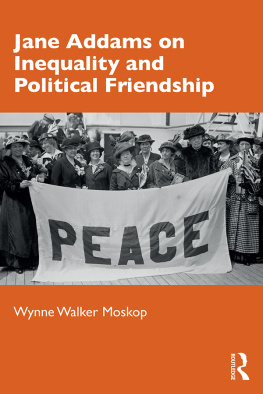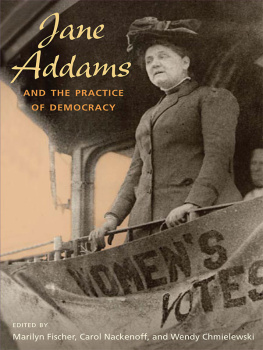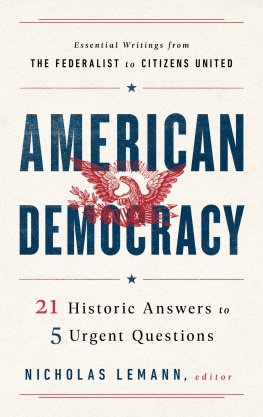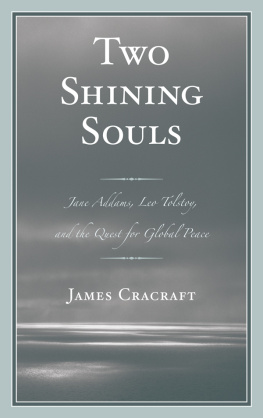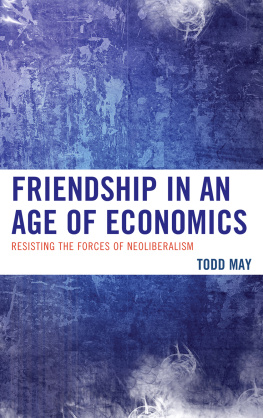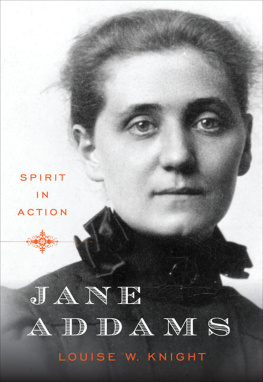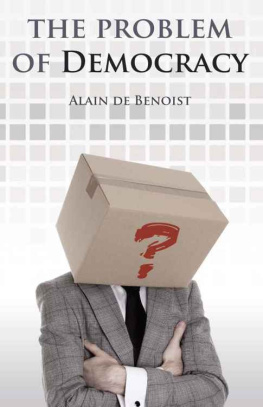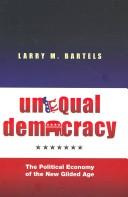JANE ADDAMS ON INEQUALITY AND POLITICAL FRIENDSHIP
In this book, Wynne Walker Moskop addresses the practical and theoretical problem of how unequal political friendships evolve toward arrangements the parties consider reciprocal and just, a problem neglected by scholars of democracy who associate reciprocity and justice only with equal parties. Jane Addams insisted that Hull House was not a charity with philanthropic aspirations; rather it had to bring two classes to a shared purpose and more egalitarian relation. The problem was, and still is, how?
Drawing on several bodies of scholarshipincluding Addamss writings, secondary works about her collaborations, literature on Aristotelian political friendship, and feminist scholarship on the global migration of care workersMoskop shows the importance of Addamss practices to the continuing relevance of unequal economic relations for shaping political friendship.
Contributing to a lively conversation about Addamss work as a pragmatist thinker and social reformer that began three decades ago, Jane Addams on Inequality and Political Friendship is an invaluable resource to students of democratic theory, feminist political theory and philosophy, and American pragmatism. It illuminates the importance of overlooked conditions for friendship and justice in unequal relations, given peoples ongoing subordination because of race, class, gender, and citizenship status in the U.S. and transnationally.
Wynne Walker Moskop is Associate Professor of Political Science and affiliate Associate Professor of Womens and Gender Studies at Saint Louis University. Moskop teaches undergraduate and graduate courses on American political thought, feminist theory, contemporary ideologies, and the history of political thought. Her articles and reviews have appeared in a range of journals, including American Political Thought, American Quarterly, the Journal of Political Psychology, American Studies, Political Theory, American Political Science Review, the Quarterly Journal of Ideology, and The Journal of Politics.
First published 2020
by Routledge
52 Vanderbilt Avenue, New York, NY 10017
and by Routledge
2 Park Square, Milton Park, Abingdon, Oxon OX14 4RN
Routledge is an imprint of the Taylor & Francis Group, an informa business
2020 Taylor & Francis
The right of Wynne Walker Moskop to be identified as author of this work has been asserted by her in accordance with sections 77 and 78 of the Copyright, Designs and Patents Act 1988.
All rights reserved. No part of this book may be reprinted or reproduced or utilised in any form or by any electronic, mechanical, or other means, now known or hereafter invented, including photocopying and recording, or in any information storage or retrieval system, without permission in writing from the publishers.
Trademark notice: Product or corporate names may be trademarks or registered trademarks, and are used only for identification and explanation without intent to infringe.
Library of Congress Cataloging-in-Publication Data
Names: Moskop, Wynne Walker, author.
Title: Jane Addams on inequality and political friendship / Wynne Walker Moskop.
Description: New York, NY : Routledge, 2019. | Includes bibliographical references and index.
Identifiers: LCCN 2019005439 (print) | LCCN 2019007804 (ebook) | ISBN 9780203731154 (Master) | ISBN 9781351399333 (Adobe) | ISBN 9781351399319 (Mobi) | ISBN 9781351399326 (ePub3) | ISBN 9781138303348 (hardback) | ISBN 9781138303355 (pbk.) | ISBN 9780203731154 (e-book)
Subjects: LCSH: Addams, Jane, 18601935--Political and social views. | Equality--United States. | Friendship--Political aspects.
Classification: LCC HV28.A35 (ebook) | LCC HV28.A35 M67 2019 (print) | DDC 303.3/720973--dc23
LC record available at https://lccn.loc.gov/2019005439
ISBN: 978-1-138-30334-8 (hbk)
ISBN: 978-1-138-30335-5 (pbk)
ISBN: 978-0-203-73115-4 (ebk)
In memory of my parents, who gave me a love for ideas and conversation, and an appreciation for differences among people. For me, these find deep satisfaction in the feminist pragmatist narratives of Jane Addams.
And
In memory of two of my family who shared Addamss Progressive Era activism, great aunt Helen W. Tippy, a resident of Hull House and labor lawyer, and great grandfather Worth M. Tippy, a Methodist minister and leader in the Protestant social gospel movement.
And
To my family and friends who continue to add immeasurably to my life and my store of perspectives.
Jane Addams is a largely untapped resource for democratic political theory. She is deservedly famous as a social reformer, a founder of the settlement house movement in the U.S., a founder of social work, a suffrage and peace activist, and a winner of the Nobel Peace Prize. Her achievements qualify her as a pre-eminent practitioner of political friendship. Since Aristotle, political friendship has been understood as a collaboration among parties who share a common purpose, on terms that all parties consider reciprocal and just. But, from my perspective as a political theorist, Addams was more than a practitioner. She wrote five books about her experiences at Hull House and in the womens international peace movement. These books, and many articles and speeches, detail her collaborations, and possibilities for better collaborations, across boundaries of class, ethnicity, race, gender, and nation. Her narratives about those experiences reveal her as a pre-eminent theorist of political friendship. Her major contribution to democratic political thought and practice is to look for justice and reciprocity where modern democratic thinkers have not looked: in relations between parties who are unequal.
Modern democratic thinkers since the seventeenth century have understood justice and reciprocity to apply only to equal relations, usually relations among democratic citizens. The problem with this modern version of justice, as feminist care thinkers have observed, is that it provides no moral guidance for parties in unequal dependency relations. Addams responds to this problem by working out what justice and reciprocity require in unequal relations between those at the top of systemic economic hierarchies and those at the bottom. I wrote this book because I have been so taken by the problem and by Addamss response.
All of us are deeply involved in unequal relations at different stages in our lives; such relations shape our families, our work, and our associations in the larger society. Beyond unequal relations that are visible to us, we are caught up in less visible neoliberal market relations that serve upper class financial interests at the top of systemic economic hierarchies at the expense of poor and oppressed peoples at the bottom. These relations are proliferating subnationally and transnationally. I believe Addamss writings provide a sorely needed theoretical and practical guide for developing political friendships that are reciprocal and just in the context of inequality. I hope this book will motivate others to find the inspiration in Addams that I have found.
This book owes much to advice and assistance from many. I want to acknowledge first the scholars who have shaped the revival of interest in Addams over the last three decades. I took inspiration from Mary Jo Deegan, Marilyn Fischer, Maurice Hamington, Wendy Sarvasy, and Charlene Seigfried, whose work has been especially important to my understanding of Addamss practice of political friendship across boundaries of class, ethnicity, race, gender, and nation. Also key was Hilda Satt Polachecks account of life at Hull House (1991), the only published account by a neighborhood resident. In addition, I am indebted to the institutions that have digitized so much of Addamss work. Without these easily accessible online texts, this project would have taken much longer.

